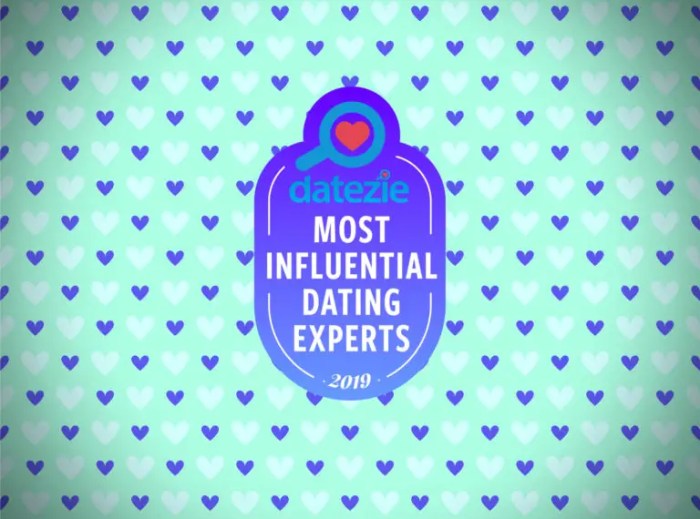Navigating the complexities of modern dating can feel like traversing a minefield. This exploration delves into the world of US dating experts, examining their diverse approaches, popular advice topics, and the effectiveness of their methodologies. We’ll uncover the secrets to successful dating strategies, exploring both traditional wisdom and cutting-edge techniques. From relationship coaching to mastering online dating, we’ll analyze how these experts help individuals navigate the challenges and find lasting connections.
This comprehensive guide offers a nuanced perspective on the evolving landscape of dating advice, comparing and contrasting the methods employed by leading experts. We’ll dissect real-life scenarios, showcasing the practical application of expert advice and acknowledging potential limitations. Ultimately, our goal is to empower readers with the knowledge and tools necessary to confidently navigate the world of dating and build fulfilling relationships.
Popular Dating Advice Topics from US Experts

Source: lifecoachingandtherapy.com
US dating experts consistently address a core set of concerns and questions from singles navigating the complexities of modern relationships. These topics reflect evolving societal norms and technological advancements in the dating world, emphasizing communication, emotional intelligence, and self-awareness as crucial elements for successful relationships.
Understanding these common themes provides a valuable framework for individuals seeking guidance in their dating lives. The advice offered is often multifaceted, drawing on psychological principles, sociological observations, and practical strategies. It’s important to remember that while expert advice provides valuable insight, individual experiences and preferences remain paramount.
Five Most Common Dating Advice Topics
Several recurring themes dominate the advice dispensed by US dating experts. These topics represent the most frequently asked questions and the areas where individuals often struggle the most. Understanding these key areas allows individuals to proactively address potential challenges and build stronger, healthier relationships.
- Communication Skills: Experts consistently emphasize the importance of clear, assertive, and empathetic communication. Advice often includes active listening techniques, expressing needs and boundaries respectfully, and practicing non-violent communication strategies.
- Identifying Compatibility: Finding a partner with shared values, life goals, and communication styles is a central theme. Experts advise on recognizing red flags early on and prioritizing compatibility over superficial attraction.
- Navigating Dating Apps and Online Profiles: With the rise of online dating, advice on crafting effective profiles, choosing appropriate platforms, and managing online interactions is crucial. This includes tips on safety, etiquette, and managing expectations.
- Building Healthy Relationships: This involves advice on establishing trust, managing conflict constructively, and fostering emotional intimacy. Experts often emphasize the importance of self-awareness, emotional regulation, and healthy boundaries.
- Overcoming Relationship Challenges: Dating experts frequently address issues such as jealousy, infidelity, and communication breakdowns. Strategies for conflict resolution, forgiveness, and seeking professional help are commonly discussed.
Expert Perspectives on Difficult Conversations
Difficult conversations are inevitable in any relationship. However, the approach to these conversations significantly impacts the outcome. Experts offer diverse perspectives on how to navigate these challenges effectively.
- The “Empathy-First” Approach: Some experts emphasize starting by understanding the other person’s perspective before expressing your own. This involves active listening and validating their feelings, even if you don’t agree with them. The goal is to create a safe space for open dialogue.
- The “Structured Communication” Approach: Other experts advocate for a more structured approach, suggesting using specific communication models like “I” statements (“I feel hurt when…”) to clearly express feelings without blame. This method emphasizes clarity and directness while minimizing defensiveness.
- The “Mindfulness-Based” Approach: This approach prioritizes self-awareness and emotional regulation during difficult conversations. Experts suggest practicing mindfulness techniques to stay calm and centered, reducing reactivity and improving the ability to respond thoughtfully instead of reacting impulsively.
Evolving Landscape of Dating Advice
Traditional dating advice often focused on gender roles and societal expectations, emphasizing courtship rituals and passive communication styles. Modern approaches, however, prioritize individual autonomy, healthy boundaries, and open communication. The shift reflects changes in societal norms and the increasing prevalence of online dating.
Traditional advice might have suggested women should be passive and wait for men to initiate contact, while modern advice empowers individuals to express their needs and desires directly. Traditional advice might have discouraged open communication about past relationships, while modern approaches encourage honesty and transparency as a foundation for trust.
Strategies for Improving Communication
Experts offer a range of strategies to enhance communication within relationships. These techniques are designed to foster understanding, empathy, and mutual respect, leading to stronger and more fulfilling connections.
- Active Listening: This involves fully concentrating on the speaker, asking clarifying questions, and reflecting back what you’ve heard to ensure understanding. It goes beyond simply hearing words; it’s about understanding the underlying emotions and intentions.
- Non-Violent Communication (NVC): This method focuses on expressing needs and feelings without blame or judgment. It emphasizes empathy and understanding, aiming to resolve conflicts collaboratively.
- Regular Check-ins: Experts suggest setting aside dedicated time for open and honest communication about the relationship’s dynamics, needs, and concerns. This proactive approach prevents small issues from escalating into larger conflicts.
Effectiveness of US Dating Expert Advice

Source: datezie.com
The effectiveness of dating expert advice in the US varies significantly depending on the individual’s approach, the client’s receptiveness, and the inherent complexities of human relationships. While some experts boast high success rates, others face criticism for promoting unrealistic expectations or offering generic, ineffective strategies. A critical evaluation necessitates comparing different methodologies and acknowledging inherent limitations.
Comparative Analysis of Dating Expert Methodologies
Three prominent dating experts exemplify diverse approaches: John Gottman, focusing on relationship maintenance and conflict resolution; Matthew Hussey, emphasizing self-improvement and attracting desirable partners; and Amy North, specializing in understanding male psychology and communication techniques. Gottman’s methodology is rooted in extensive research and observation, employing scientific methods to identify patterns in successful and unsuccessful relationships. His advice often centers on communication skills, conflict management, and building emotional intimacy. Hussey’s approach is more focused on self-confidence and personal branding, advocating for self-improvement to attract a compatible partner. North, conversely, focuses on understanding the nuances of male communication and behavior, providing women with strategies to navigate dating dynamics more effectively. These contrasting approaches highlight the diverse perspectives within the field and the lack of a single “best” method.
Application of Amy North’s Advice to a Real-Life Scenario
Amy North’s advice often centers on understanding male communication styles and responding effectively. Consider a scenario where Sarah, a woman in her late twenties, consistently experiences dating disappointments. She feels men are often unresponsive or lose interest quickly. Applying North’s principles, a step-by-step approach might involve:
- Understanding Male Communication: Sarah learns to recognize subtle cues in male communication, such as indirect expressions of interest or disinterest. She might notice a decrease in texting frequency or a change in tone, signaling potential disengagement.
- Strategic Communication: Instead of directly asking “Why aren’t you texting me?”, Sarah might employ a more indirect approach, such as playfully teasing or expressing her own busy schedule. This avoids appearing needy or demanding.
- Building Anticipation and Mystery: Sarah focuses on creating intrigue by not always being immediately available or overly responsive. She allows space for the man to pursue her, fostering a sense of anticipation and desire.
- Focus on High-Value Interactions: Sarah prioritizes engaging in activities and conversations that showcase her interests and personality, creating genuine connection rather than solely focusing on romantic pursuit.
- Observing and Adapting: Sarah pays close attention to each man’s individual responses and adjusts her communication strategy accordingly, recognizing that not every technique works with every person.
Limitations of Relying Solely on Expert Advice
While dating expert advice can be valuable, relying solely on it presents limitations. Individual experiences and personalities are unique; what works for one person may not work for another. Over-reliance on prescribed techniques can lead to inauthenticity and hinder genuine connection. Furthermore, some experts may promote unrealistic expectations or offer advice that is culturally biased or insensitive. Finally, the advice itself is often generalized and lacks the personalized nuance that a therapist or counselor could provide. The advice should be considered a starting point, not a guaranteed formula for success.
Comparison of Dating Expert Approaches
| Expert | Methodology | Pros | Cons |
|---|---|---|---|
| John Gottman | Scientific research, relationship maintenance | Evidence-based, focuses on long-term relationship health | May not be directly applicable to initial stages of dating |
| Matthew Hussey | Self-improvement, attracting desirable partners | Empowering, focuses on personal growth | Can promote unrealistic expectations, overlooks compatibility issues |
| Amy North | Understanding male psychology, communication techniques | Provides practical strategies for women, addresses communication challenges | May oversimplify male behavior, risks manipulation if misused |